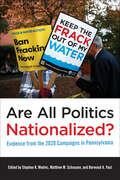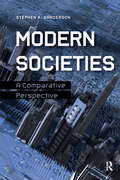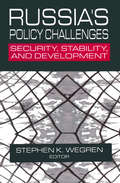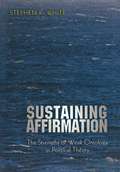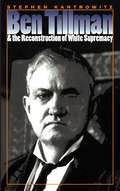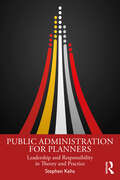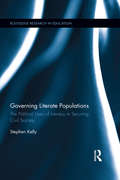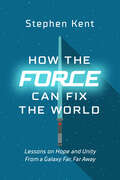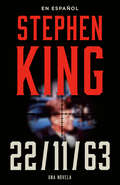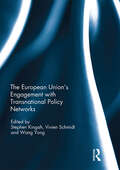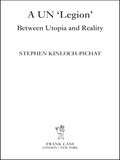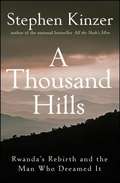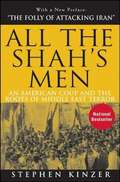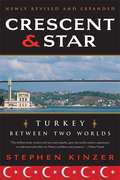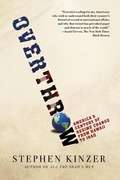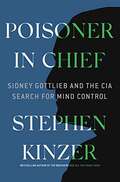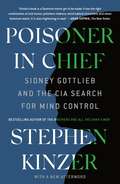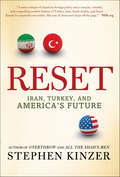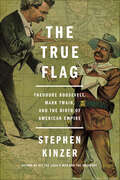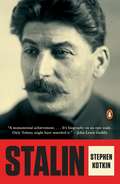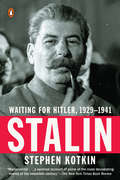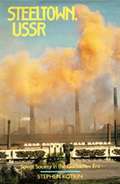- Table View
- List View
Are All Politics Nationalized?: Evidence from the 2020 Campaigns in Pennsylvania
by Stephen K. Medvic, Matthew M. Schousen and Berwood A. YostGiven the news media’s focus on national issues and debates, voters might be expected to make decisions about state and local candidates based on their views of the national parties and presidential candidates. However, nationalization as a concept, and the process by which politics becomes nationalized, are not fully understood. Are All Politics Nationalized? addresses this knowledge gap by looking at the behavior of candidates and the factors that influence voters’ electoral choices. The editors and contributors examine the 2020 elections in six Pennsylvania districts to explore the level of nationalization in campaigns for Congress and state legislature. They also question if politicians are encouraging nationalized behavior and straight ticket voting—especially with down-ballot races. Are All Politics Nationalized? concludes that issues specific to particular districts—such as fracking and local union politics—still matter, and candidates are eager to connect with voters by highlighting their ties to the local community. National politics do trickle down to local races, but races up and down the ballot are still heavily localized.
Modern Societies: A Comparative Perspective
by Stephen K. SandersonFirst Published in 2016. Routledge is an imprint of Taylor & Francis, an Informa company.
Russia's Policy Challenges: Security, Stability and Development
by Stephen K. WegrenDesigned for use in courses on contemporary Russia, this volume explores Russia's policy dilemmas in three realms: international security, socio-political, and socio-economic. In each of these categories, Russia faces daunting problems, none of which is likely to be resolved quickly or easily. Yet, over the longer term, the extent to which policymakers are successful in dealing with these challenges will go far in determining Russia's future place in the world, how Russians will live, and what kind of country Russia becomes. Each expertly authored chapter outlines the nature of one major issue; traces it evolution and policy developments under the Yeltsin and Putin presidencies; and evaluates the effectiveness and prospects of efforts to come to grips with the challenge.
Sustaining Affirmation: The Strengths of Weak Ontology in Political Theory
by Stephen K. WhiteIn light of many recent critiques of Western modernity and its conceptual foundations, the problem of adequately justifying our most basic moral and political values looms large. Without recourse to traditional ontological or metaphysical foundations, how can one affirm--or sustain--a commitment to fundamentals? The answer, according to Stephen White, lies in a turn to "weak" ontology, an approach that allows for ultimate commitments but at the same time acknowledges their historical, contestable character. This turn, White suggests, is already underway. His book traces its emergence in a variety of quarters in political thought today and offers a clear and compelling account of what this might mean for our late modern self-understanding.As he elaborates the idea of weak ontology and the broad criteria behind it, White shows how these are already at work in the thought of contemporary writers of seemingly very different perspectives: George Kateb, Judith Butler, Charles Taylor, and William Connolly. Among these thinkers, often thought to be at odds, he exposes the commonalities that emerge around the idea of weak ontology. In its identification of a critical turn in political theory, and its nuanced explanation of that turn, his book both demonstrates and underscores the strengths of weak ontology.
Ben Tillman and the Reconstruction of White Supremacy
by Stephen KantrowitzThrough the life of Benjamin Ryan Tillman (1847-1918), South Carolina's self-styled agrarian rebel, this book traces the history of white male supremacy and its discontents from the era of plantation slavery to the age of Jim Crow.As an anti-Reconstruction guerrilla, Democratic activist, South Carolina governor, and U.S. senator, Tillman offered a vision of reform that was proudly white supremacist. In the name of white male militance, productivity, and solidarity, he justified lynching and disfranchised most of his state's black voters. His arguments and accomplishments rested on the premise that only productive and virtuous white men should govern and that federal power could never be trusted. Over the course of his career, Tillman faced down opponents ranging from agrarian radicals to aristocratic conservatives, from woman suffragists to black Republicans. His vision and his voice shaped the understandings of millions and helped create the violent, repressive world of the Jim Crow South.Friend and foe alike--and generations of historians--interpreted Tillman's physical and rhetorical violence in defense of white supremacy as a matter of racial and gender instinct. This book instead reveals that Tillman's white supremacy was a political program and social argument whose legacies continue to shape American life.
Public Administration for Planners: Leadership and Responsibility in Theory and Practice
by Stephen KehsThis book offers an introduction to public administration by a veteran practitioner, written for planners, as well as students seeking a public administration career and individuals simply wanting to learn more about responsible government. The narrative provides an overview of public administration theory and the importance of leadership in today’s contentious political environment. The book contains five parts including an introduction, parts on management, the public sector and government programs, and some impressions on why this subject is so critically important in our society today. Typical administrative responsibilities are addressed as well as issues not typically covered in books on public administration, along with observations about sound public administration. Each part also contains practical exercises, discussion questions and references to other texts and academic resources. Because public administration is fundamentally about relationships with people and communities, the book provides lessons that can be applied easily to one’s personal life and experiences. It is a timely narrative on public administration today that will be valuable reading for planners and planning students looking to better understand public administration and policy.
Governing Literate Populations: The Political Uses of Literacy in Securing Civil Society (Routledge Research in Education)
by Stephen KellySecuring the hearts and minds of ‘dangerous’ populations is a major concern for governments across the world. Governing Literate Populations shows how ‘governmentalities’ have deployed education and literacy in different ways in order to protect their national, social, economic and geopolitical security interests. Presenting a Foucauldian Genealogy of literacy and education, Kelly argues that government apparatuses strategically contain the rise of complex social forces to protect homogenous cultural values. Kelly’s work traces the development of the relationship between liberal governmentalities and the securitization of ‘martial’ literate citizenries from its beginnings in the Enlightenment, starting with Hobbes’ Leviathan in 1651, through to the emergence of human security in 1994. He then examines the situation in Australia from 1995-2007, investigating political statements by the Howard Government and the insurgent Rudd opposition against the backdrop of the ‘age of terror’. The conclusion takes another historical cut by considering how the political uses of literacy can be located in the texts of Plato, before examining how the conceptualization of literate subject as citizen of the state has come to be realized in the United Kingdom and the United States of America. Governing Literate Populations draws on data obtained from historical texts, including political and economic treatises, publications by NGOS, media sites, government policies and archived political speeches. As such, it will appeal to academics, researchers and postgraduate students examining education policy and the political uses of education, as well as literacy education and the history of education. Those with an interest in politics, sociology and history will also find this work a highly informative resource.
How the Force Can Fix the World: Lessons on Life, Liberty, and Happiness from a Galaxy Far, Far Away
by Stephen KentFrom widespread unemployment and mounting international hostilities, every day we are swept into more political chaos—so one brave man looks to the Star Wars universe for answers to our most urgent problems.&“You can&’t stop the change — anymore than you can stop the sun from setting.&” Anakin Skywalker was never able to live with this wisdom shared by his mother on the day he left home to train as a Jedi Knight. That failure led him to becoming the fearsome villain we all know as Darth Vader. We&’re living in a time of unprecedented and rapid change. An age of chaos. Democracies are in decline worldwide. Dictators are ascendant. Civic organizations are crumbling. People feel lonelier and more rudderless than in any other time in recent history. We&’ve tried to slow down, and in some cases we, like Anakin, have tried stop the change, but failed at every turn. The fears that come with living in an age of disruption have produced public anger, and that anger has swelled movements of hate. Author Stephen Kent believes part of the solution is hiding in plain sight. A story that binds together multiple generations with a common language, a moral framework, and a sense of wonder. It&’s Star Wars. What if we looked to Star Wars for more than just entertainment? How the Force Can Fix the World takes this challenge on by analyzing the core principles of the Star Wars franchise: HOPE, CHOICE, HUMILITY, EMPATHY, REDEMPTION, BALANCE and rejecting FEAR. Together, these are the Star Wars roadmap for living better lives, and maybe even fostering a better politics. The path that we&’re on — where fear leads to anger, and anger to hatred — will only end in suffering. But Star Wars shows us the way back from the brink. Shared stories of virtue that are beloved across cultures and political divides are hard to come by, but Star Wars is one such story. Turn on the news; things are pretty broken right now — but the Force can fix the world.
Desert Collapses: Why No One Deserves Anything (Routledge Studies in Ethics and Moral Theory)
by Stephen KershnarPeople consider desert part of our moral world. It structures how we think about important areas such as love, punishment, and work. This book argues that no one deserves anything. If this is correct, then claims that people deserve general and specific things are false. At the heart of desert is the notion of moral credit or discredit. People deserve good things (credit) when they are good people or do desirable things. These desirable things might be right, good, or virtuous acts. People deserve bad things (discredit) when they are bad people or do undesirable things. On some theories, people deserve credit in general terms. For instance, they deserve a good life. On other theories, people deserve credit in specific terms. For instance, they deserve specific incomes, jobs, punishments, relationships, or reputations. The author’s argument against desert rests on three claims: There is no adequate theory of what desert is. Even if there were an adequate theory of what desert is, nothing grounds (justifies) desert. Even if there were an adequate theory of what desert is and something were to ground it, there is no plausible account of what people deserve. Desert Collapses will be of interest to researchers and advanced students working in ethics and political philosophy.
22/11/63: A Novel
by Stephen KingEl 22 de noviembre de 1963, tres disparos resonaron en Dallas. Murió el presidente Kennedy, y el mundo cambió. ¿Qué harías tú si pudieras impedirlo? Jake Epping es un profesor de ingles en una preparatoria en Lisbon Falls, Maine, quien además complementa su salario dando clases nocturnas para adultos. Un día, Jake recibe un ensayo escrito por uno de sus estudiantes—una aterradora historia sobre una noche de hace cincuenta años, en la que el padre de Harry Dunning asesino a su esposa y a dos de sus hijos con un martillo. Harry, quien escribe el ensayo, logro escapar con solo una herida en la pierna, que hasta ese dia le causa problemas al caminar. Poco después, Al, el propietario de un restaurante local y amigo de Jake, le cuenta un secreto: el almacén del restaurante es un portal a 1958. Así es como Jake se encuentra en medio de la aventura mas arriesgada de su vida: impedir el asesinato del presidente John F. Kennedy. En esta nueva vida, Jake—ahora George Amberson—emprende la búsqueda del solitario Lee Harvey Oswald entre canciones de Elvis, autos de moda y humo de cigarrillos, ayudado por una bella bibliotecaria llamada Sadie Dunhill, quien se convertirá en el amor de su vida.
22/11/63: A Novel
by Stephen KingEl 22 de noviembre de 1963, tres disparos resonaron en Dallas. Murió el presidente Kennedy, y el mundo cambió. ¿Qué harías tú si pudieras impedirlo? Jake Epping es un profesor de ingles en una preparatoria en Lisbon Falls, Maine, quien además complementa su salario dando clases nocturnas para adultos. Un día, Jake recibe un ensayo escrito por uno de sus estudiantesuna aterradora historia sobre una noche de hace cincuenta años, en la que el padre de Harry Dunning asesino a su esposa y a dos de sus hijos con un martillo. Harry, quien escribe el ensayo, logro escapar con solo una herida en la pierna, que hasta ese dia le causa problemas al caminar. Poco después, Al, el propietario de un restaurante local y amigo de Jake, le cuenta un secreto: el almacén del restaurante es un portal a 1958. Así es como Jake se encuentra en medio de la aventura mas arriesgada de su vida: impedir el asesinato del presidente John F. Kennedy. En esta nueva vida, Jakeahora George Ambersonemprende la búsqueda del solitario Lee Harvey Oswald entre canciones de Elvis, autos de moda y humo de cigarrillos, ayudado por una bella bibliotecaria llamada Sadie Dunhill, quien se convertirá en el amor de su vida.
The European Union’s Engagement with Transnational Policy Networks
by Stephen Kingah Vivien Schmidt Wang YongThis book is the first of its kind to paint a comprehensive picture of the manner in which the European Union (the EU) interacts with transnational policy networks (TPNs). The TPNs covered are those in a variety of fields including: conflict-prone natural resources, health, energy security, migration, human trafficking, combating of terrorism financing and climate change. The chapters are developed around six main lines of inquiry. The lines of inquiry articulated are: modalities through which the EU influences TPNs around the world, TPNs’ influence of policy and decision-making within the EU, conditions under which engagement between the TPNs and the EU may be regarded as successful, the identity and location of the TPNs and finally the added value or futility of a strategy developed in Brussels to weaken or fortify interactions with the networks studied. The importance of TPNs should be approached from the angle of the heightened attention now placed on informal modes of decision making. Increasingly there is a sense that many international decisions are adopted and internalized through networks that can be efficient yet wanting in transparency. The book unveils complex debates on the inter-phase between inter-governmental / supranational entities like the EU, on the one hand, and networks, on the other. The physiognomy of this inter-phase matters not only for the EU but also for other such inter-governmental/ supranational bodies as well as networks. This book was previously published as a special issue of Contemporary Politics.
A UN 'Legion': Between Utopia and Reality
by Stephen Kinloch PichatA fresh examination of the origins, evolution and future of proposals for a UN 'Legion' - a permanent military force recruited, trained and deployed by the UN. This new book shows how this idea has grown, re-emerged and evolved in direct connection with the development of UN international military forces. The legionnaires have been seen as the future representatives of a modern constabulary, international police or humanitarian chivalry. They have also invariably evoked the idea of mercenaries and resurrected fears of supranational government and a 'world army'. Such a force has been unattainable when needed, not needed when attainable, revealing the deficiencies of the international system in the perspective of a particular task. The idea highlights the inadequacy of the means as compared to the objectives, and the limits of the UN's capacity to adapt itself to new challenges. This study examinmes how the project of a UN 'Legion' is conditional on the viability of the original Utopia, and vice versa. It also argues that the extreme polarization of the debate may reflect a tendency to negate the inherent contradictions of reality, reminding us of the historical dimension of the building of an international organization, a 'work in progress'.
A Thousand Hills: Rwanda’s Rebirth and the Man Who Dreamed it
by Stephen KinzerA Thousand Hills: Rwanda's Rebirth and the Man Who Dreamed It is the story of Paul Kagame, a refugee who, after a generation of exile, found his way home. In this adventurous tale, learn about Kagame’s early fascination with Che Guevara and James Bond, his years as an intelligence agent, his training in Cuba and the United States, the way he built his secret rebel army, his bloody rebellion, and his outsized ambitions for Rwanda.
All The Shah's Men: An American Coup And The Roots Of Middle East Terror
by Stephen KinzerWith a thrilling narrative that sheds much light on recent events, this national bestseller brings to life the 1953 CIA coup in Iran that ousted the country's elected prime minister, ushered in a quarter-century of brutal rule under the Shah, and stimulated the rise of Islamic fundamentalism and anti-Americanism in the Middle East. Selected as one of the best books of the year by the Washington Post and The Economist, it now features a new preface by the author on the folly of attacking Iran.
Crescent And Star: Turkey Between Two Worlds
by Stephen KinzerIn the first edition of this widely praised book, Stephen Kinzer made the convincing claim that Turkey was the country to watch -- poised between Europe and Asia, between the glories of its Ottoman past and its hopes for a democratic future, between the dominance of its army and the needs of its civilian citizens, between its secular expectations and its Muslim traditions. In this newly revised edition of Crescent and Star, he adds much important new information on the many exciting transformations in Turkey's government and politics that have kept it in the headlines, and also shows how recent developments in both American and European policies (and not only the war in Iraq) have affected this unique and perplexing nation.
Overthrow: Americans Century of Regime Change, from Hawaii to Iraq
by Stephen Kinzer"Detailed, passionate and convincing . . . [with] the pace and grip of a good thriller. "--Anatol Lieven,The New York Times Book Review "Regime change" did not begin with the administration of George W. Bush, but has been an integral part of U. S. foreign policy for more than one hundred years. Starting with the toppling of the Hawaiian monarchy in 1893, the United States has not hesitated to overthrow governments that stood in the way of its political and economic goals. The invasion of Iraq in 2003 is but the latest example of the dangers inherent in these operations. InOverthrow, Stephen Kinzer tells the stories of the audacious politicians, spies, military commanders, and business executives who took it upon themselves to depose foreign regimes. He details the three eras of America's regime-change century--the imperial era, which brought Cuba, Puerto Rico, the Philippines, Nicaragua, and Honduras under America's sway; the cold war era, which employed covert action against Iran, Guatemala, South Vietnam, and Chile; and the invasion era, which saw American troops toppling governments in Grenada, Panama, Afghanistan, and Iraq. Kinzer explains why the U. S. government has pursued these operations and why so many of them have had disastrous long-term consequences, making Over throw a cautionary tale that serves as an urgent warning as the United States seeks to define its role in the modern world.
Poisoner In Chief: Sidney Gottlieb And The Cia Search For Mind Control
by Stephen KinzerThe bestselling author of All the Shah’s Men and The Brothers tells the astonishing story of the man who oversaw the CIA’s secret drug and mind-control experiments of the 1950s and ’60s. The visionary chemist Sidney Gottlieb was the CIA’s master magician and gentlehearted torturer―the agency’s “poisoner in chief.” As head of the MK-ULTRA mind control project, he directed brutal experiments at secret prisons on three continents. He made pills, powders, and potions that could kill or maim without a trace―including some intended for Fidel Castro and other foreign leaders. He paid prostitutes to lure clients to CIA-run bordellos, where they were secretly dosed with mind-altering drugs. His experiments spread LSD across the United States, making him a hidden godfather of the 1960s counterculture. For years he was the chief supplier of spy tools used by CIA officers around the world. Stephen Kinzer, author of groundbreaking books about U.S. clandestine operations, draws on new documentary research and original interviews to bring to life one of the most powerful unknown Americans of the twentieth century. Gottlieb’s reckless experiments on “expendable” human subjects destroyed many lives, yet he considered himself deeply spiritual. He lived in a remote cabin without running water, meditated, and rose before dawn to milk his goats. During his twenty-two years at the CIA, Gottlieb worked in the deepest secrecy. Only since his death has it become possible to piece together his astonishing career at the intersection of extreme science and covert action. Poisoner in Chief reveals him as a clandestine conjurer on an epic scale.
Poisoner in Chief: Sidney Gottlieb and the CIA Search for Mind Control
by Stephen KinzerThe bestselling author of All the Shah’s Men and The Brothers tells the astonishing story of the man who oversaw the CIA’s secret drug and mind-control experiments of the 1950s and ’60s.The visionary chemist Sidney Gottlieb was the CIA’s master magician and gentlehearted torturer—the agency’s “poisoner in chief.” As head of the MK-ULTRA mind control project, he directed brutal experiments at secret prisons on three continents. He made pills, powders, and potions that could kill or maim without a trace—including some intended for Fidel Castro and other foreign leaders. He paid prostitutes to lure clients to CIA-run bordellos, where they were secretly dosed with mind-altering drugs. His experiments spread LSD across the United States, making him a hidden godfather of the 1960s counterculture. For years he was the chief supplier of spy tools used by CIA officers around the world.Stephen Kinzer, author of groundbreaking books about U.S. clandestine operations, draws on new documentary research and original interviews to bring to life one of the most powerful unknown Americans of the twentieth century. Gottlieb’s reckless experiments on “expendable” human subjects destroyed many lives, yet he considered himself deeply spiritual. He lived in a remote cabin without running water, meditated, and rose before dawn to milk his goats.During his twenty-two years at the CIA, Gottlieb worked in the deepest secrecy. Only since his death has it become possible to piece together his astonishing career at the intersection of extreme science and covert action. Poisoner in Chief reveals him as a clandestine conjurer on an epic scale.
Reset: Iran, Turkey, and America's Future
by Stephen KinzerThe bestselling author of Overthrow offers a new and surprising vision for rebuilding America's strategic partnerships in the Middle East What can the United States do to help realize its dream of a peaceful, democratic Middle East? Stephen Kinzer offers a surprising answer in this paradigm-shifting book. Two countries in the region, he argues, are America's logical partners in the twenty-first century: Turkey and Iran.Besides proposing this new "power triangle," Kinzer also recommends that the United States reshape relations with its two traditional Middle East allies, Israel and Saudi Arabia. This book provides a penetrating, timely critique of America's approach to the world's most volatile region, and offers a startling alternative.Kinzer is a master storyteller with an eye for grand characters and illuminating historical detail. In this book he introduces us to larger-than-life figures, like a Nebraska schoolteacher who became a martyr to democracy in Iran, a Turkish radical who transformed his country and Islam forever, and a colorful parade of princes, politicians, women of the world, spies, oppressors, liberators, and dreamers. Kinzer's provocative new view of the Middle East is the rare book that will richly entertain while moving a vital policy debate beyond the stale alternatives of the last fifty years.
The True Flag: Theodore Roosevelt, Mark Twain, And The Birth Of American Empire
by Stephen KinzerHow should the United States act in the world? Americans cannot decide. Sometimes we burn with righteous anger, launching foreign wars and deposing governments. Then we retreat—until the cycle begins again. <p><p> No matter how often we debate this question, none of what we say is original. Every argument is a pale shadow of the first and greatest debate, which erupted more than a century ago. Its themes resurface every time Americans argue whether to intervene in a foreign country. <p> Revealing a piece of forgotten history, Stephen Kinzer transports us to the dawn of the twentieth century, when the United States first found itself with the chance to dominate faraway lands. That prospect thrilled some Americans. It horrified others. Their debate gripped the nation. <p> The country’s best-known political and intellectual leaders took sides. Theodore Roosevelt, Henry Cabot Lodge, and William Randolph Hearst pushed for imperial expansion; Mark Twain, Booker T. Washington, and Andrew Carnegie preached restraint. Only once before—in the period when the United States was founded—have so many brilliant Americans so eloquently debated a question so fraught with meaning for all humanity. <p> All Americans, regardless of political perspective, can take inspiration from the titans who faced off in this epic confrontation. Their words are amazingly current. Every argument over America’s role in the world grows from this one. It all starts here.
The True Flag: Theodore Roosevelt, Mark Twain, and the Birth of American Empire
by Stephen KinzerThe bestselling author of Overthrow and The Brothers brings to life the forgotten political debate that set America’s interventionist course in the world for the twentieth century and beyond.How should the United States act in the world? Americans cannot decide. Sometimes we burn with righteous anger, launching foreign wars and deposing governments. Then we retreat—until the cycle begins again. No matter how often we debate this question, none of what we say is original. Every argument is a pale shadow of the first and greatest debate, which erupted more than a century ago. Its themes resurface every time Americans argue whether to intervene in a foreign country. Revealing a piece of forgotten history, Stephen Kinzer transports us to the dawn of the twentieth century, when the United States first found itself with the chance to dominate faraway lands. That prospect thrilled some Americans. It horrified others. Their debate gripped the nation. The country’s best-known political and intellectual leaders took sides. Theodore Roosevelt, Henry Cabot Lodge, and William Randolph Hearst pushed for imperial expansion; Mark Twain, Booker T. Washington, and Andrew Carnegie preached restraint. Only once before—in the period when the United States was founded—have so many brilliant Americans so eloquently debated a question so fraught with meaning for all humanity. All Americans, regardless of political perspective, can take inspiration from the titans who faced off in this epic confrontation. Their words are amazingly current. Every argument over America’s role in the world grows from this one. It all starts here.
Stalin: Paradoxes of Power, 1878-1928
by Stephen KotkinA magnificent new biography that revolutionizes our understanding of Stalin and his worldIt has the quality of myth: a poor cobbler&’s son, a seminarian from an oppressed outer province of the Russian empire, reinvents himself as a top leader in a band of revolutionary zealots. When the band seizes control of the country in the aftermath of total world war, the former seminarian ruthlessly dominates the new regime until he stands as absolute ruler of a vast and terrible state apparatus, with dominion over Eurasia. While still building his power base within the Bolshevik dictatorship, he embarks upon the greatest gamble of his political life and the largest program of social reengineering ever attempted: the collectivization of all agriculture and industry across one sixth of the earth. Millions will die, and many more millions will suffer, but the man will push through to the end against all resistance and doubts.Where did such power come from? In Stalin, Stephen Kotkin offers a biography that, at long last, is equal to this shrewd, sociopathic, charismatic dictator in all his dimensions. The character of Stalin emerges as both astute and blinkered, cynical and true believing, people oriented and vicious, canny enough to see through people but prone to nonsensical beliefs. We see a man inclined to despotism who could be utterly charming, a pragmatic ideologue, a leader who obsessed over slights yet was a precocious geostrategic thinker—unique among Bolsheviks—and yet who made egregious strategic blunders. Through it all, we see Stalin&’s unflinching persistence, his sheer force of will—perhaps the ultimate key to understanding his indelible mark on history.Stalin gives an intimate view of the Bolshevik regime&’s inner geography of power, bringing to the fore fresh materials from Soviet military intelligence and the secret police. Kotkin rejects the inherited wisdom about Stalin&’s psychological makeup, showing us instead how Stalin&’s near paranoia was fundamentally political, and closely tracks the Bolshevik revolution&’s structural paranoia, the predicament of a Communist regime in an overwhelmingly capitalist world, surrounded and penetrated by enemies. At the same time, Kotkin demonstrates the impossibility of understanding Stalin&’s momentous decisions outside of the context of the tragic history of imperial Russia.The product of a decade of intrepid research, Stalin is a landmark achievement, a work that recasts the way we think about the Soviet Union, revolution, dictatorship, the twentieth century, and indeed the art of history itself.Stalin: Waiting for Hitler, 1929-1941 will be published by Penguin Press in October 2017
Stalin: Waiting for Hitler, 1929-1941
by Stephen Kotkin&“Monumental.&” —The New York Times Book ReviewPulitzer Prize-finalist Stephen Kotkin has written the definitive biography of Joseph Stalin, from collectivization and the Great Terror to the conflict with Hitler's Germany that is the signal event of modern world history In 1929, Joseph Stalin, having already achieved dictatorial power over the vast Soviet Empire, formally ordered the systematic conversion of the world&’s largest peasant economy into &“socialist modernity,&” otherwise known as collectivization, regardless of the cost. What it cost, and what Stalin ruthlessly enacted, transformed the country and its ruler in profound and enduring ways. Building and running a dictatorship, with life and death power over hundreds of millions, made Stalin into the uncanny figure he became. Stephen Kotkin&’s Stalin: Waiting for Hitler, 1929–1941 is the story of how a political system forged an unparalleled personality and vice versa. The wholesale collectivization of some 120 million peasants necessitated levels of coercion that were extreme even for Russia, and the resulting mass starvation elicited criticism inside the party even from those Communists committed to the eradication of capitalism. But Stalin did not flinch. By 1934, when the Soviet Union had stabilized and socialism had been implanted in the countryside, praise for his stunning anti-capitalist success came from all quarters. Stalin, however, never forgave and never forgot, with shocking consequences as he strove to consolidate the state with a brand new elite of young strivers like himself. Stalin&’s obsessions drove him to execute nearly a million people, including the military leadership, diplomatic and intelligence officials, and innumerable leading lights in culture. While Stalin revived a great power, building a formidable industrialized military, the Soviet Union was effectively alone and surrounded by perceived enemies. The quest for security would bring Soviet Communism to a shocking and improbable pact with Nazi Germany. But that bargain would not unfold as envisioned. The lives of Stalin and Hitler, and the fates of their respective dictatorships, drew ever closer to collision, as the world hung in the balance. Stalin: Waiting for Hitler, 1929–1941 is a history of the world during the build-up to its most fateful hour, from the vantage point of Stalin&’s seat of power. It is a landmark achievement in the annals of historical scholarship, and in the art of biography.
Steeltown, USSR: Soviet Society in the Gorbachev Era
by Stephen KotkinNo one, not even Mikhail Gorbachev, anticipated what was in store when the Soviet Union embarked in the 1980s on a radical course of long-overdue structural reform. The consequences of that momentous decision, which set in motion a transformation eventually affecting the entire postwar world order, are here chronicled from inside a previously forbidden Soviet city, Magnitogorsk. Built under Stalin and championed by him as a showcase of socialism, the city remained closed to Western scrutiny until four years ago, when Stephen Kotkin became the first American to live there in nearly half a century. An uncommonly perceptive observer, a gifted writer, and a first-rate social scientist, Kotkin offers the reader an unsurpassed portrait of daily life in the Gorbachev era. From the formation of "informal" political groups to the start-up of fledgling businesses in the new cooperative sector, from the no-holds-barred investigative reporting of a former Communist party mouthpiece to a freewheeling multi-candidate election campaign, the author conveys the texture of contemporary Soviet society in the throes of an upheaval not seen since the 1930s. Magnitogorsk, a planned "garden city" in the Ural Mountains, serves as Kotkin's laboratory for observing the revolutionary changes occurring in the Soviet Union today. Dominated by a self-perpetuating Communist party machine, choked by industrial pollution, and haunted by a suppressed past, this once-proud city now faces an uncertain future, as do the more than one thousand other industrial cities throughout the Soviet Union. Kotkin made his remarkable first visit in 1987 and returned in 1989. On both occasions, steelworkers and schoolteachers, bus drivers and housewives, intellectuals and former victims of oppression--all willingly stepped forward to voice long-suppressed grievances and aspirations. Their words animate this moving narrative, the first to examine the impact and contradictions of perestroika in a single community. Like no other Soviet city, Magnitogorsk provides a window onto the desperate struggle to overcome the heavy burden of Stalin's legacy.
